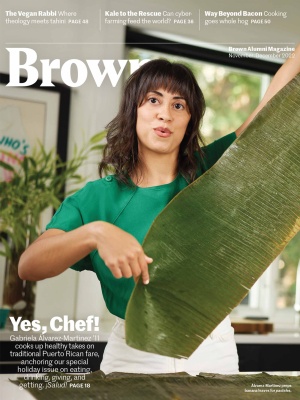Baked-in Memories
How food transports us to people and places
One winter break from Brown, Hernán Merea ’87 and I traveled to Peru, where on a side street in his native Lima I was transported by a fresh jugo that was my first taste of mango, like an intense, gingery version of the peaches I’d grown up with in rural Virginia, fresh from the orchard down the way, sweet and ripe like I’ve rarely found anywhere else. Later, in Arequipa, we both were newcomers to cuy, aka guinea pig, served on its back, paws clenched, front teeth bared in failed defiance, bits of long fur still clinging to its side. What little I could scrape off its skinny ribs tasted nondescript, like chicken. To drink, Hernán, on a mission to try every traditional small-town offering, recommended we order chicha de jora, a weirdly viscous sour beer I learned was traditionally made with spit, to speed fermentation. I’ll sure never forget that meal.
Delicious or disgusting, food is uniquely evocative, perhaps in part because we literally can’t forget it—if we forget to eat, we’ll die. If we eat badly, we’ll get sick. And if we’re sick, it’s often a job for chicken soup—or, if you’re chef Gabriela Álvarez-Martinez ’11, time to creatively adapt your native cuisine to be as healthy as it is delicious.
Food is baked into our memories of Brown—like getting fresh-cut slabs of Muenster cheese on pumpernickel from Big Mother Coffeehouse or Portuguese sweetbread from Fox Point’s Silver Star Bakery, just out of the oven in the wee hours after a night of carousing. Top chef Suzanne Goin ’88 centered her latest restaurant on Portuguese cuisine, in large part because of her memories of Portuguese food in Providence.
I remember the fragrant tomatoes and excessive zucchini Frederic Evans and I grew in the mid-’80s in our two plots at the Southside Community Land Trust, founded by Deborah Schimberg ’80. Fred, a Brown linguistics grad student who was ABD when he died of AIDS in 1994, dubbed them “the north forty” and “the south forty.” Early one morning I went to water the plots and one of the Hmong refugees who farmed quite expertly next to our amateur gardens, their raised beds bursting with produce, handed me a big bunch of just-plucked cilantro, the pungent smell of which, before breakfast, nearly knocked the “thank you” right out of my mouth. Unforgettable. As was the experience of eating vegetables we’d grown ourselves.
Irving Fain ’02 is putting a cyber-spin on locally grown produce with his high-tech vertical farming operation that may just transform the way the world farms. Which brings us to international commerce and politics. Of course the thing that most sustains us also divides us. In All the Pigs in China, you’ll find a fascinating analysis of how China’s growing appetite for pork has pushed and pulled on the U.S. economy.
You’re receiving this issue just as we enter a season of winter holidays: Thanksgiving, Hanukkah, Las Posadas, Christmas, Kwanzaa and more, all with special food and drink traditions. Another tradition, back again, is our guide to holiday giving, whether it’s supporting alumni-founded charities or giving alumni-made gifts like a bottle of beets from Dan Rosenberg ’98 and his Real Pickles Cooperative. Bon appetit!




